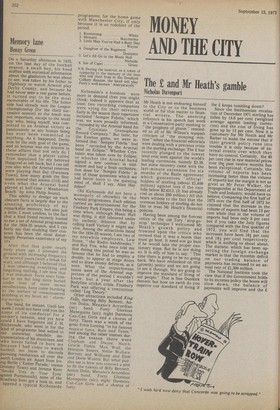Memory lane
Benny Green
On a Saturday afternoon in 1935, on the last day of the football season, a small boy, his head stuffed with statistical information about the gladiators he was about to see, was taken by his father to Highbury to watch Arsenal play Derby County, and because he had never seen a real game before, it turned out to be the most memorable of his life. The home side had already won the League championship (for the third successive season) so the result was not important, except to the small boy who, being myself, was committed to an Arsenal victory as passionately as any human being has ever been committed to anything. As it happened, Derby won by the only goal of the game, and so intense was my interest in these affairs that not only do I remember that a player called Trim deputised for my beloved Hapgood at left back, but I can tell you also who the Arsenal reserves were playing that day (Swansea : Town), how many goals the first team scored that season (115) and even what the Arsenal band played at half-time (' Manhattan Beach' by John Philip Sousa).
This ability to dredge up such obscure facts is largely due to the amazing proficiency of my remarkable memory, but also just a little, I must confess, to the fact that a kind friend recently loaned to me a set of Arsenal programmes for the 1934-35 season, and I can fairly say that studying their contents has been the most disturbingly Proustian experience of my life.
After that first game nearly forty years ago, I attended the ground with increasing frequency for several years (with a break for war), and although I believed that I was observing everything and forgetting nothing, I see now that I was mistaken. Facts once familiar to me but long since buried under tons of more recent recollections, have come bursting to the surface of consciousness stabbing at my heart wi alarm. ing sav('gry.
The band, for instant. Until last week I could not have told you the name of its conductor for a striker's ransom, and yet how could I have forgotten old J. H. Kichenside, who went in for the kind of programme best suited to the somewhat unsubtle instrumentation of his musicians, and who never failed to bore me because I had come to watch Ifootball, not listen to discords pursuing resolutions all over the 'north London air. Apart from Irving Berlin (' Easter Parade,' versus Grimsby Town) and Jerome Kern Smoke Yets in Your Eyes' igainst Portsmouth), none of the 3roadway lions got a look in, and append a typical Kichenside programme, for the home game with Manchester City, if only because it is so redolent of the period:
1. Boomerang White 2. Menuett Boccherine 3. Little Man You've Had a Busy Day Wayne 4. Daughter of the Regiment Donizetti 5. Let's All Go to the Music Hall Nicholls 6. Isle of Capri Grosz N.B. During the interval, as a token of sympathy to the memory of the men who lost their lives in the Gresford Colliery disaster, the band will play Parry's well-known 'Aberystwyth.'
Kichenside's s hotshots were more in demand than you might think; indeed it appears that at least two recording companies were vying for their services. Early in the season their repertoire included ' Semper Fidelis,' which was, we were proudly informed, " recorded by the Arsenal band for the Crystalate Gramophone Record Company." But later, for the Everton game, we were informed that ' Semper Fidelis ' had been "recorded by the Arsenal band on Eclipse." Whether Crystalate was taken over by Eclipse, or whether the Arsenal band signed a new contract in midseason and had a fresh orchestration done for Semper Fidelis ' is one of those questions which we had better leave to the questing mind of, shall I say, Alan Hardaker?
Old Kichenside did not have a monopoly of showbiz in the Arsenal programmes. Each edition carried an advertisement for the Finsbury Park Empire, this being a time when, although Music Hall was dying, it still laboured under the pathetic delusion that by calling itself Variety it might survive. Among the attractions listed for the 1934-35 season, I see two of my erstwhile employers, Lew Stone, "the Radio bandleader," and Roy Fox, who once told me that during this period he was so famous that he had to employ a double, to appear at stage doors and so draw enemy defences, as it were. What the terpsichorean tastes were of the Arsenal supporters of the period I wouldn't know, but a year after the Bodyline cricket crisis, Finsbury Park was offering a concoction called 'Leg Theory.' Other attractions included King Folly, starring Billy Bennett, Anton Dolin, Mexano's Accordian (sic) band, Forty Glorious Manequins (sic), eight Darmora Can-Can Girls and a chorus of forty. There was a week of the great Ernie Looting "in his famous musical farce, Rate and Taxes," and among the other visitors during the season there were Clapham and Dwyer, Hutch, Gracie Fields, Max Wall, the Houston Sisters, Nellie Wallace, Bennett and Williams and Elsie and Doris Waters. But what puzzles me is how you concoct a plot to fit the talents of Billy Bennett, Anton Dolin, Mexano's Accordion (sic) band, Forty Glorious Manequins (sic), eight Darmora Can-Can Girls and a chorus of forty.
































 Previous page
Previous page